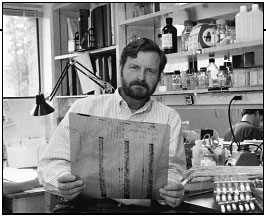Jay Dunlap is tapped as first chair of new genetics department
With his ruddy complexion and reddish beard, Jay Dunlap looks like he'd be more comfortable working in the woods than in a sunlight-deprived genetics lab. But Dunlap is an award-winning scientist who has spent his career deciphering the internal clocks that regulate organisms as simple as bread mold and as complex as humans. A member of the DMS faculty since 1984, he is also the inaugural chair of the School's new Department of Genetics.
"Jay had academic credentials that were unexcelled," says DMS Dean John Baldwin, M.D., who made the establishment of a genetics department one of his priorities as dean. "He's an internationally recognized geneticist. He's also a person who knows the community well. It was clear he would embrace the concept to make this a College-wide effort."
Recruitment: Dunlap's first task is recruiting the people who will help him build the department. By the end of this academic year, he hopes to have hired several faculty members. And within five years, the goal is to recruit 12 to 14 new professors.
"The right thing to focus on is people," Dunlap says. "Ultimately, that's the resource that you're building. As long as you have people doing interesting things, they will bring with them the technology. So you want to have a department where people see through the trees of the forest and have picked interesting questions." While a few of the new genetics professors will come from within Dartmouth, most will be brought in from other universities. "The geneticists that are here are certainly good enough," Dunlap explains. "But if they were pulled out of the departments that they were in, then that would simply impoverish those departments."

|
|
Jay Dunlap, a noted expert on the biological clock, has been selected as the
chair of Dartmouth Medical School's new Department of Genetics. |
Cusp: At a time when not only medical journals but newspapers and television shows are filled with stories about cloned sheep and DNA paternity tests and the Human Genome Project, which will finish laying open the sequence of the human genome within the next five years, the DMS department arrives on the cusp of a new era.
"We're really beginning the golden age of human genetics," says Dunlap, who earned his Ph.D. in biology from Harvard and did postdoctoral work in molecular genetics at the University of California at Santa Cruz. "All of the great questions that were asked over the last 300 years about everything, about how living things work, you can get at now in ways that you just couldn't 50 years ago."
As an example, he points to the four causes of human illness —injury, infection, mental trauma, and genetic malfunction. Scientists have learned much about three of those causes in the past hundred years, he says: "In the 20th century, we've done a lot with being able to fix cuts and bruises. We've done a lot with being able to fix infectious diseases. And we're making progress with mental health. But many genetic diseases have been simply intractable. In the next century, we'll have a lot better handle on finding out what the nature of the problem is and what can or cannot be done to fix it."
Clocks: Meanwhile, Dunlap will continue his own research on biological clocks—work that won him a prestigious MERIT Award from the National Institutes of Health in 1998 and the Honma International Prize in 1991. After years of studying the bread mold Neurospora, Dunlap and his colleagues—including his wife, Jennifer Loros, Ph.D., an associate professor of biochemistry —have recently begun studying mice.
"We started working on mice, hoping to use what we know about a very simple model," explains Dunlap. "We've learned how to think about the problem pretty well. Now we can think about the problem in a much more complex system, which is thereby a lot closer to people."
Dunlap's work is widely recognized. Steven Reppert, a biological clock expert at Harvard, calls him "an outstanding geneticist. His research discoveries have been truly seminal, leading to a better understanding of how our biological clock works at the molecular level."
Dunlap and Loros were the first scientists to isolate and then to clone the genes that govern timekeeping. They have also investigated how light and temperature reset the clocks of plants and animals. In humans, the internal clock helps control blood pressure (it increases before we wake in the morning, so when we sit up we don't faint); sleep patterns; and even sensitivity to pain. Studying the biological clock also promises to help in understanding sleep disorders, depression, and jet lag.
As for the latter problem, there is currently no remedy. Dunlap should know: in mid- November, he returned from a speaking engagement in London feeling jet-lagged.
Kathleen Burge
If you would like to offer any feedback about this article, we would welcome getting your comments at DartMed@Dartmouth.edu.
